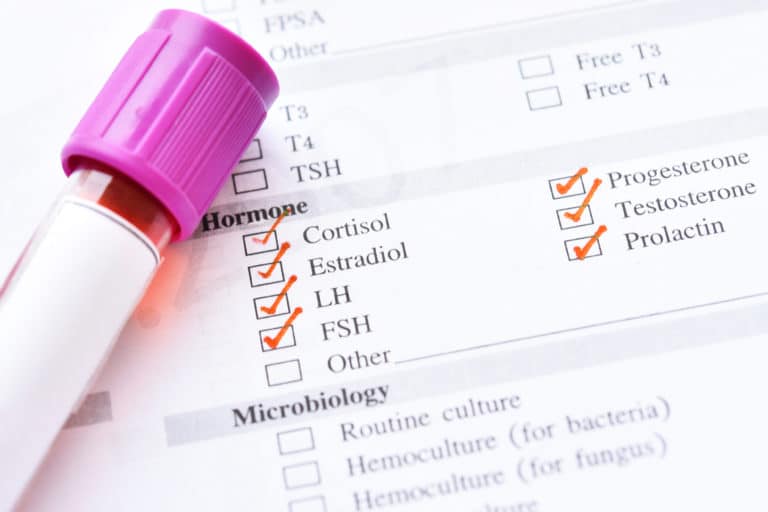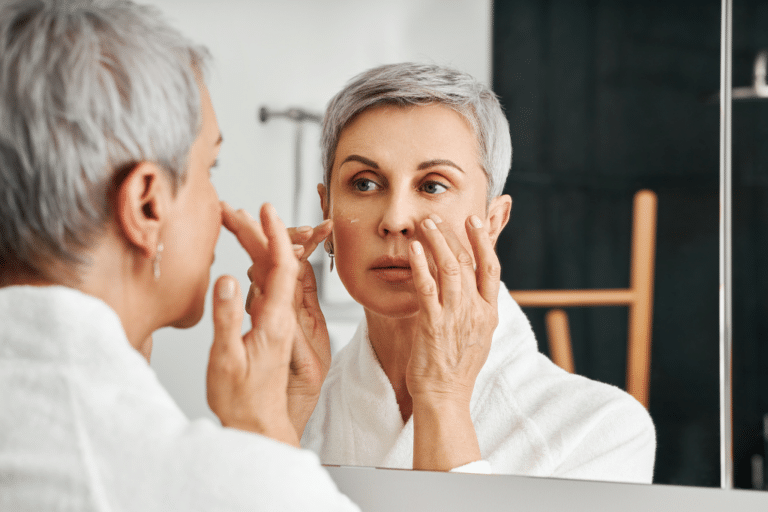“I am experiencing many signs of perimenopause. I can’t sleep, I’m tired all the time, I’m anxious about everything and OMG, the flooding periods. I went to my doctor and asked to have my hormones tested. He refused, and told me that it wouldn’t be useful because I was too young (42) and hormone levels change constantly. He did do an FSH and it was in “normal” range. I was offered birth control pills and an antidepressant, but I don’t want that! I know there’s something hormonal going on and I want to get to the bottom of it. Help!”
Hormone balance is essential to good health for women of all ages. Unfortunately, for women in early midlife, the scenario above is all too common. Hormone testing is dismissed out of hand as being useless. In my opinion, this reaction tends to come from providers who have no idea what to do with the information they might get from testing and are uncomfortable prescribing hormones at all. This leaves many women suffering when they shouldn’t have to!
It is true that hormone testing is a snapshot in time (as are all lab tests) and that levels fluctuate, but in my practice, I find testing useful to look at the magnitude of the imbalances that may be present and the metabolic pathways the woman’s body prefers. Yes, your estrogen may fluctuate, but if it’s way out of balance with progesterone, that imbalance is unlikely to correct itself at certain times during the day or month if the testing is done at the correct time in a cycle.
Let’s look at the kinds of testing and what’s best for specific hormone replacement products. Matching the type of testing with the type of hormone supplementation (if prescribed) has a great impact on the clinical usefulness of hormone assessments. If you’re measuring with the wrong method, tissue uptake of the supplemented hormone may not be accurately reflected in test results, leading to inappropriate dosing.
Baseline (no hormone replacement)
Any testing method can be used to assess baseline levels of hormones. My favorite test is the DUTCH (dried urine) for its ease of use and the fact that it gives hormone metabolites. This allows me to see the how your body is USING the hormone and whether or not you are clearing them appropriately. I use this information when creating a customized plan to provide support to pathways that may not be healthy.
Saliva for baseline testing has a few drawbacks. It is highly dependent on lab quality and does not provide cortisol metabolites which are necessary to accurately assess adrenal function.
Topical progesterone (creams)
Creams and gels cannot be effectively monitored with any lab testing. With the DUTCH test or serum testing, values increase only slightly (if at all) with dosing. With saliva testing, lab values are very high, leading prescribers to reduce doses inappropriately. Levels can stay elevated for months after therapy is discontinued.
Oral progesterone
The DUTCH test provides useful feedback when using oral progesterone to help with sleep. One of the metabolites is associated with better outcomes relative to sleep and this is the only test that provides that information. With serum and saliva, results go up and down quickly. If taken at bedtime, levels return to baseline within a few hours. Results can also be inaccurate due to progesterone metabolites cross-reacting with immunoassay tests.
Sublingual hormones (troches, lozenges)
No testing methods are accurate for monitoring dosing, however, the DUTCH test will still provide metabolite patterns.
Topical estrogen (gels, creams, sprays)
For the DUTCH test, target values between the top of the postmenopausal range and the lower third of the premenopausal range correlate with patient clinical improvement (bone density, hot flash relief, etc.). Doses that push levels to the middle of the premenopausal range and beyond may be excessive. DUTCH is preferred over serum due to the inclusion of metabolites. If using saliva, values are variable and may not correlate with symptoms.
Oral estrogen
Serum and saliva can be used to monitor oral estrogen therapy. However, the DUTCH test is not useful because much of the dose is stripped out in the liver, leading to lower urine excretion. The DUTCH test can still be used to assess metabolite patterns.
Patches, pellets and injections
Any method (serum, blood spot, saliva, DUTCH) can be used for follow up. Saliva may be less accurate than serum. Only DUTCH gives metabolic patterns in addition to hormone levels.
A word about follicle-stimulating hormone (FSH) testing
FSH is a blood test that’s commonly used to assess the hormonal status of perimenopausal women who may complain of hot flashes, mood changes, or other symptoms. But here’s the problem. It only gives an indication of how hard your body is working to produce an egg. The higher the number, the closer you are to menopause. It says NOTHING about sex hormone production or the relative imbalances. And it can fluctuate widely during the decade before menopause.
[bctt tweet=”Matching the type of testing with the type of hormone supplementation (if prescribed) has a great impact on the clinical usefulness of hormone assessments #hormoneimbalance #DUTCHtest #estrogendominance #adrenalfatigue #cortisol #hormonetesting #hormonemetabolites #DrAnnaGarrett #AnnaGarrettAsheville” username=”DrAnnaGarrett”]
Even though there are no perfect testing methods, my preference is a “test-don’t-guess” approach. Having data allows me to create a plan that is customized to a client’s specific needs and to work with her doctor if needed to get bioidentical hormones on board. The “test-don’t-guess” approach is far superior to “guess and treat”.
Unfortunately, the guess-and-treat approach is still far too common in clinical practice. Most physicians would never prescribe drugs such as a blood pressure drug or cholesterol-lowering medication without monitoring the patient appropriately. Many are, however, very willing to prescribe potent hormones without clearly understanding how the woman’s body is using them. This can result in preventable adverse effects and poor clinical outcomes; not to mention unhappy patients.
Note: if you’re struggling and want to get serum lab tests on your own, this resource offers terrific pricing and easy access if you live near a Quest blood draw center. You can order your own or contact me for guidance. https://www.ultalabtests.com/drannagarrett
Dr. Anna Garrett is a menopause expert and Doctor of Pharmacy. She helps women who are struggling with symptoms of perimenopause and menopause find natural hormone balancing solutions so they can rock their mojo through midlife and beyond. Her clients would tell you that her real gift is helping them reclaim parts of themselves they thought were gone forever.
Find out more about working with her at https://www.drannagarrett.com/work-with-me/ or click the button below to start your journey to hormone harmony today!




